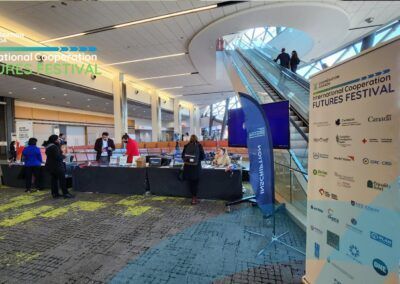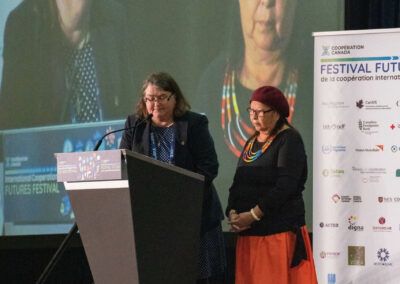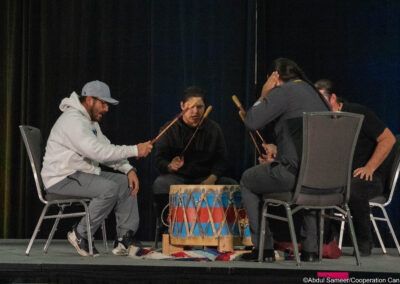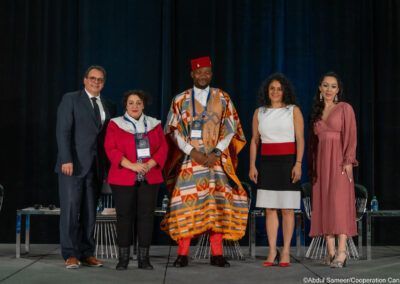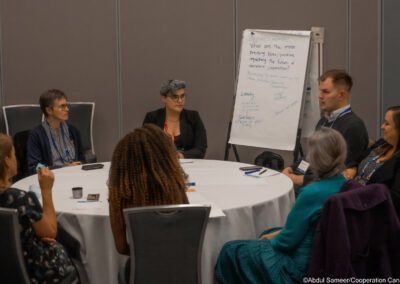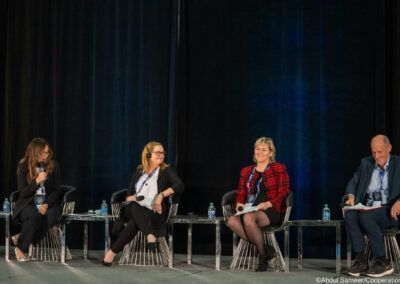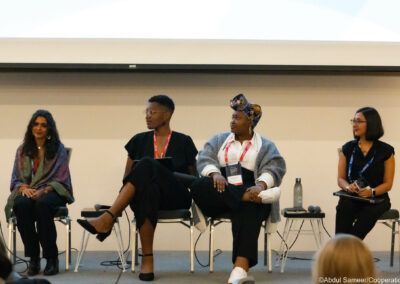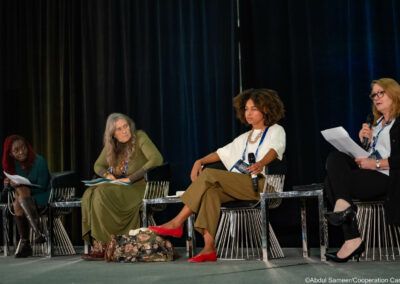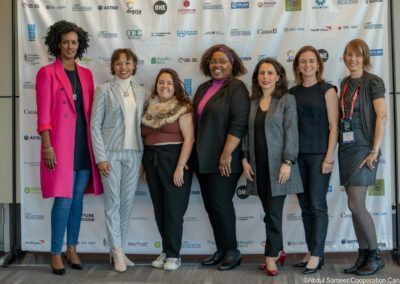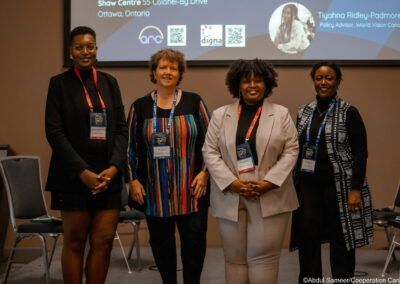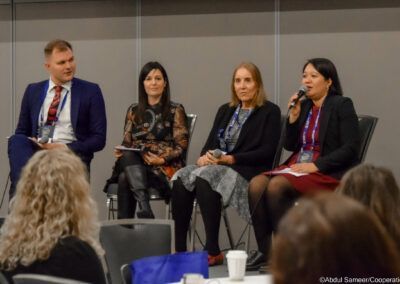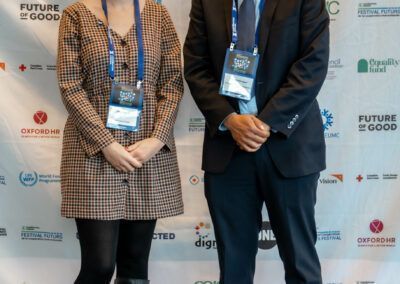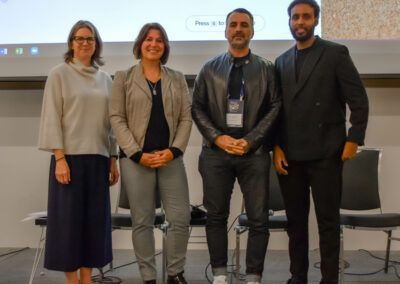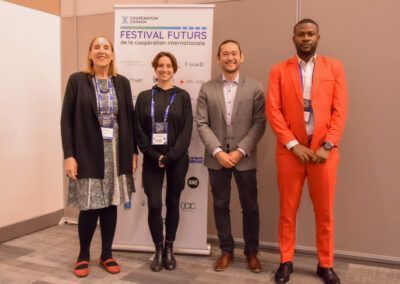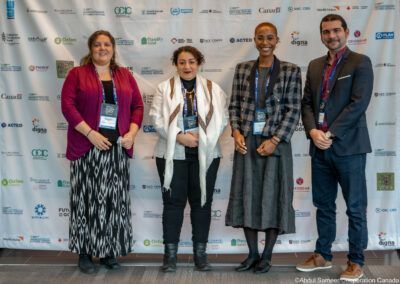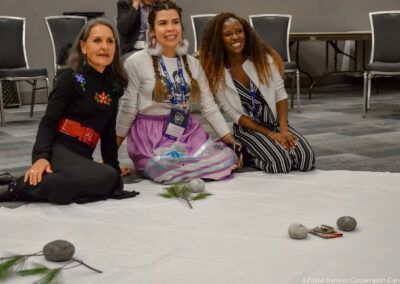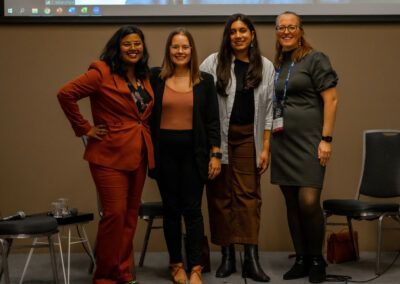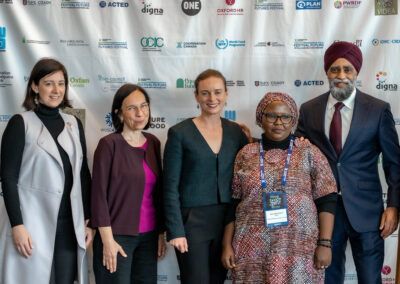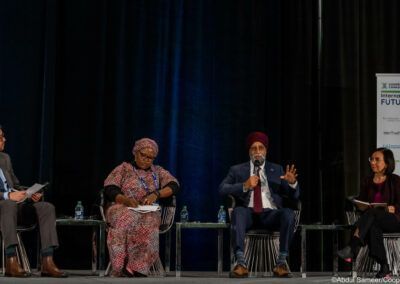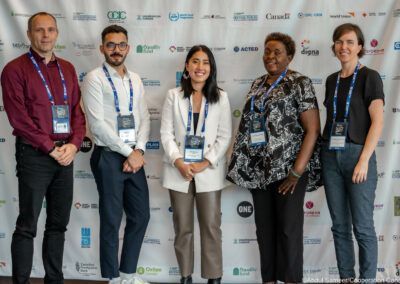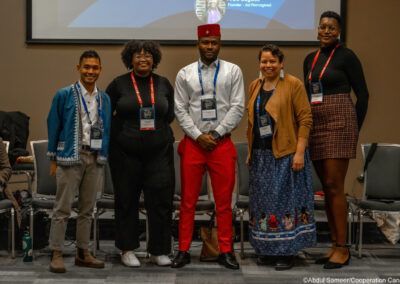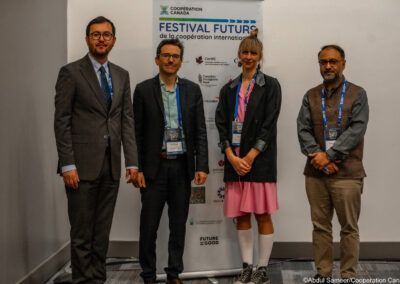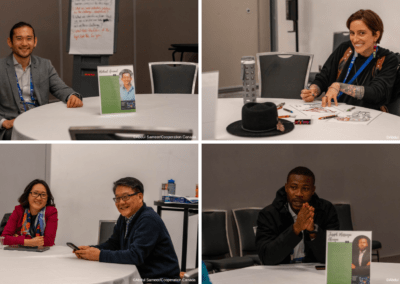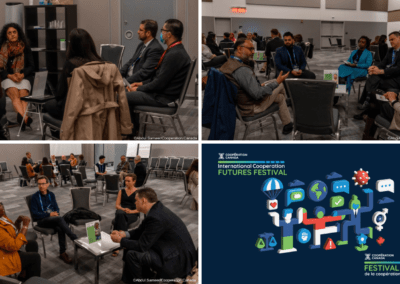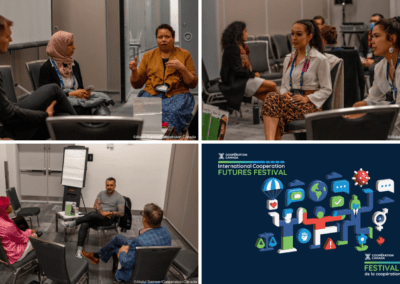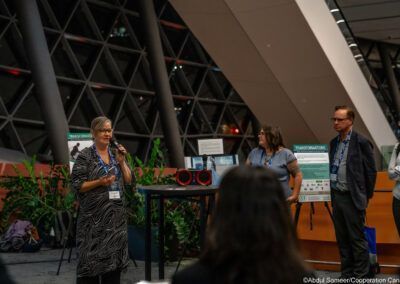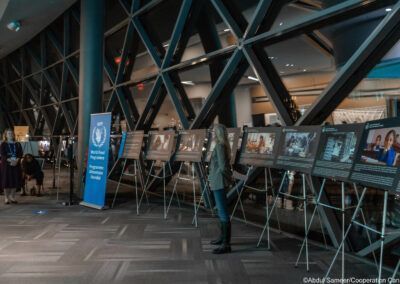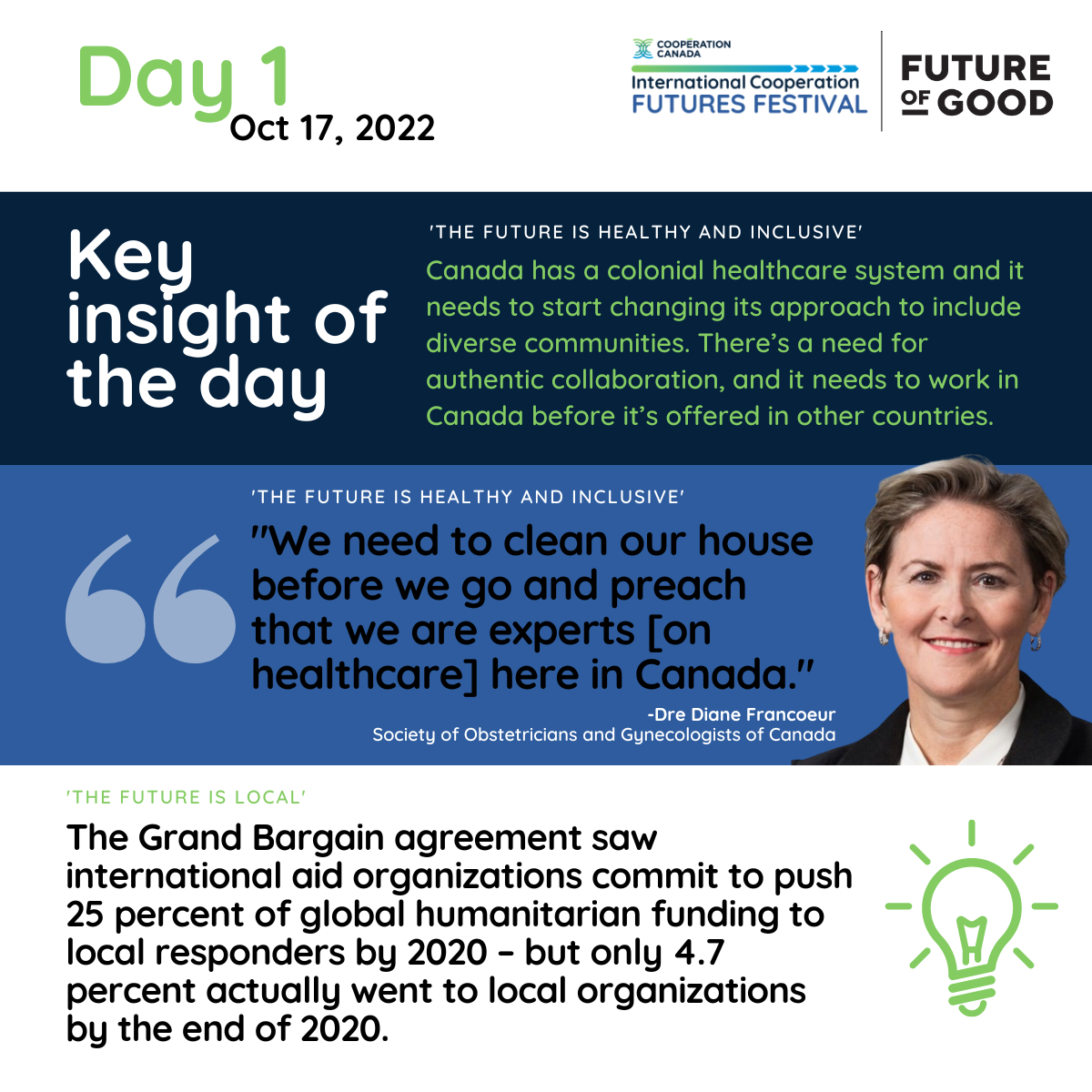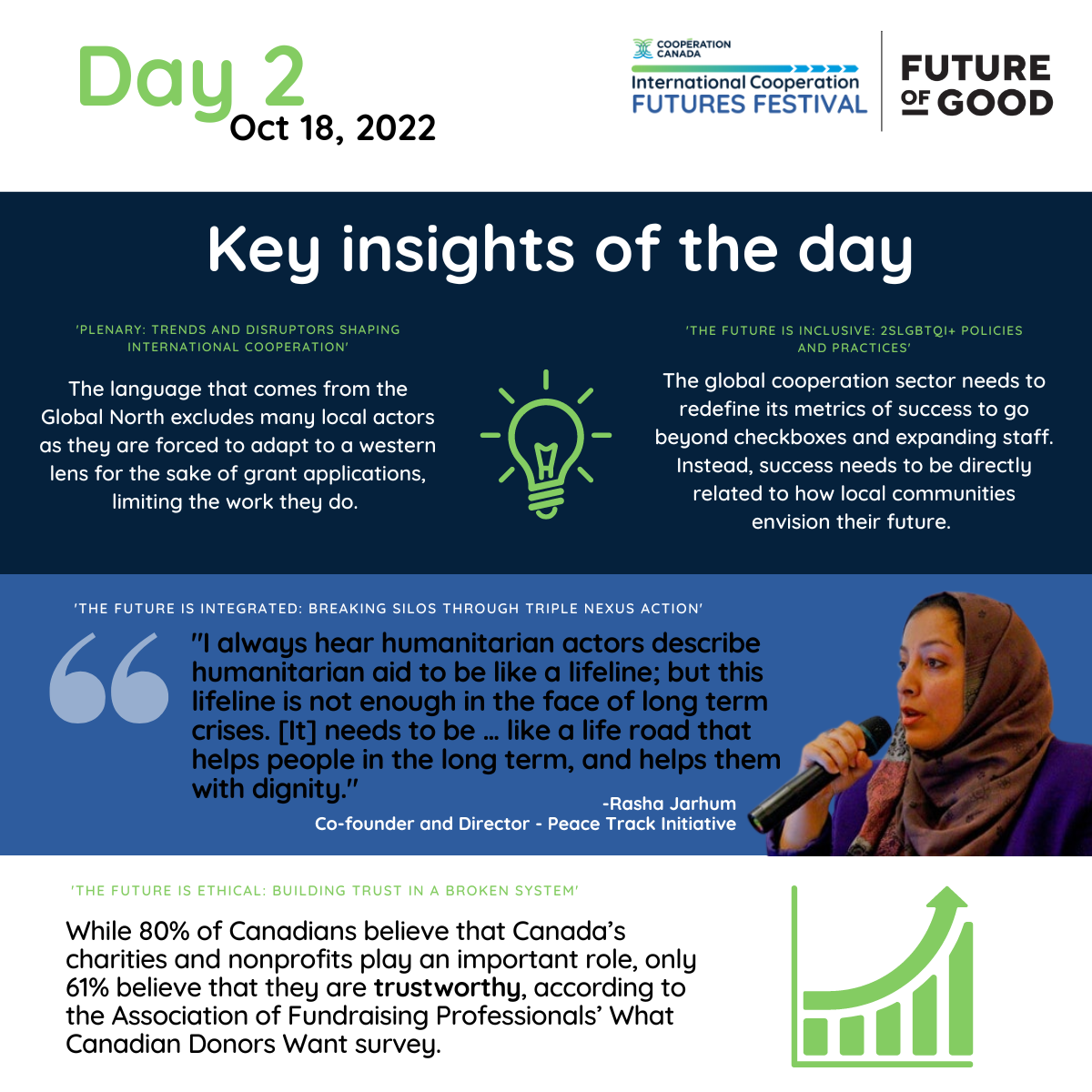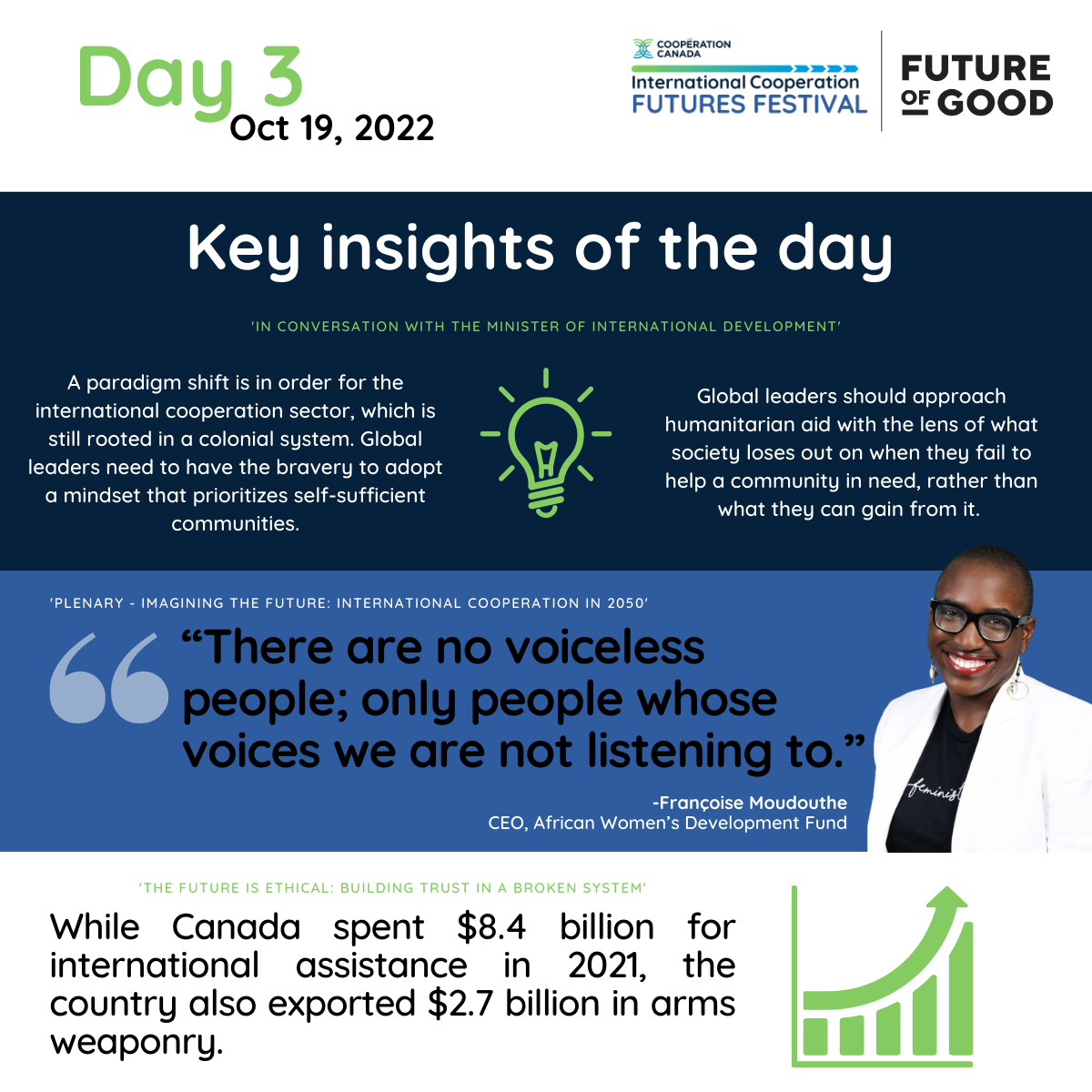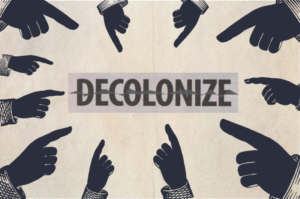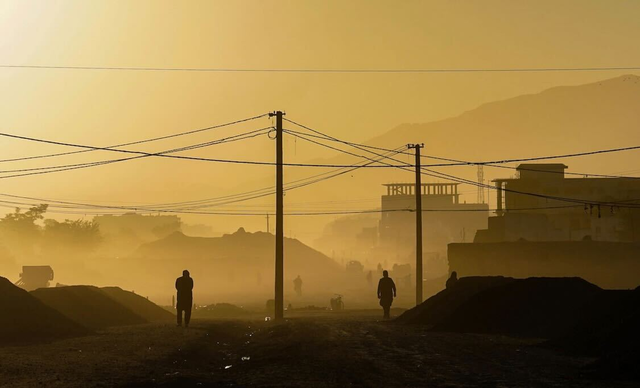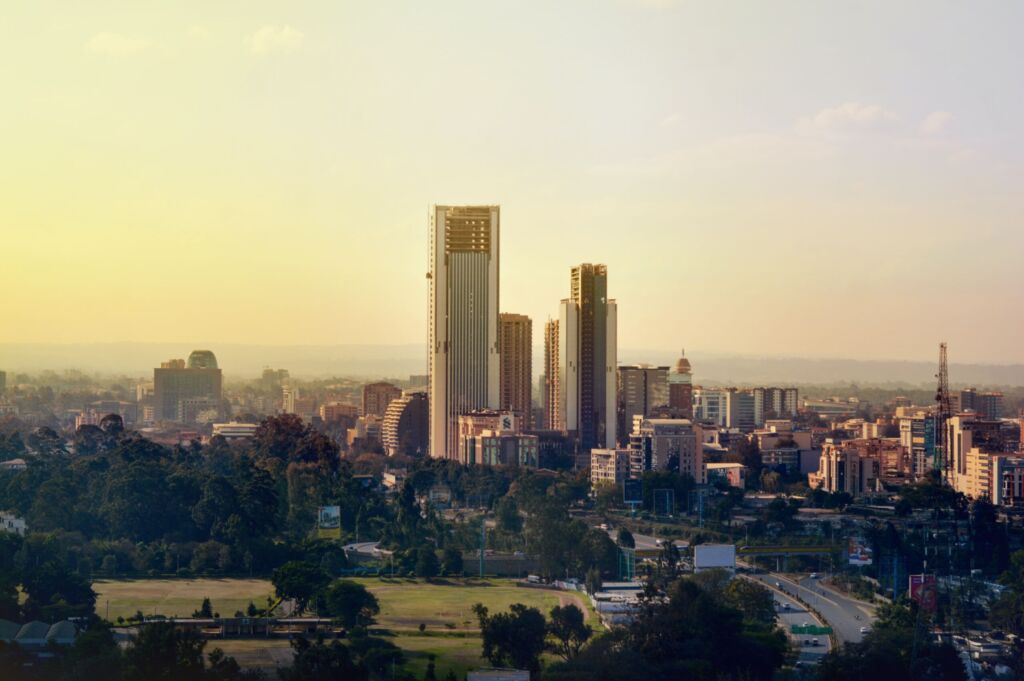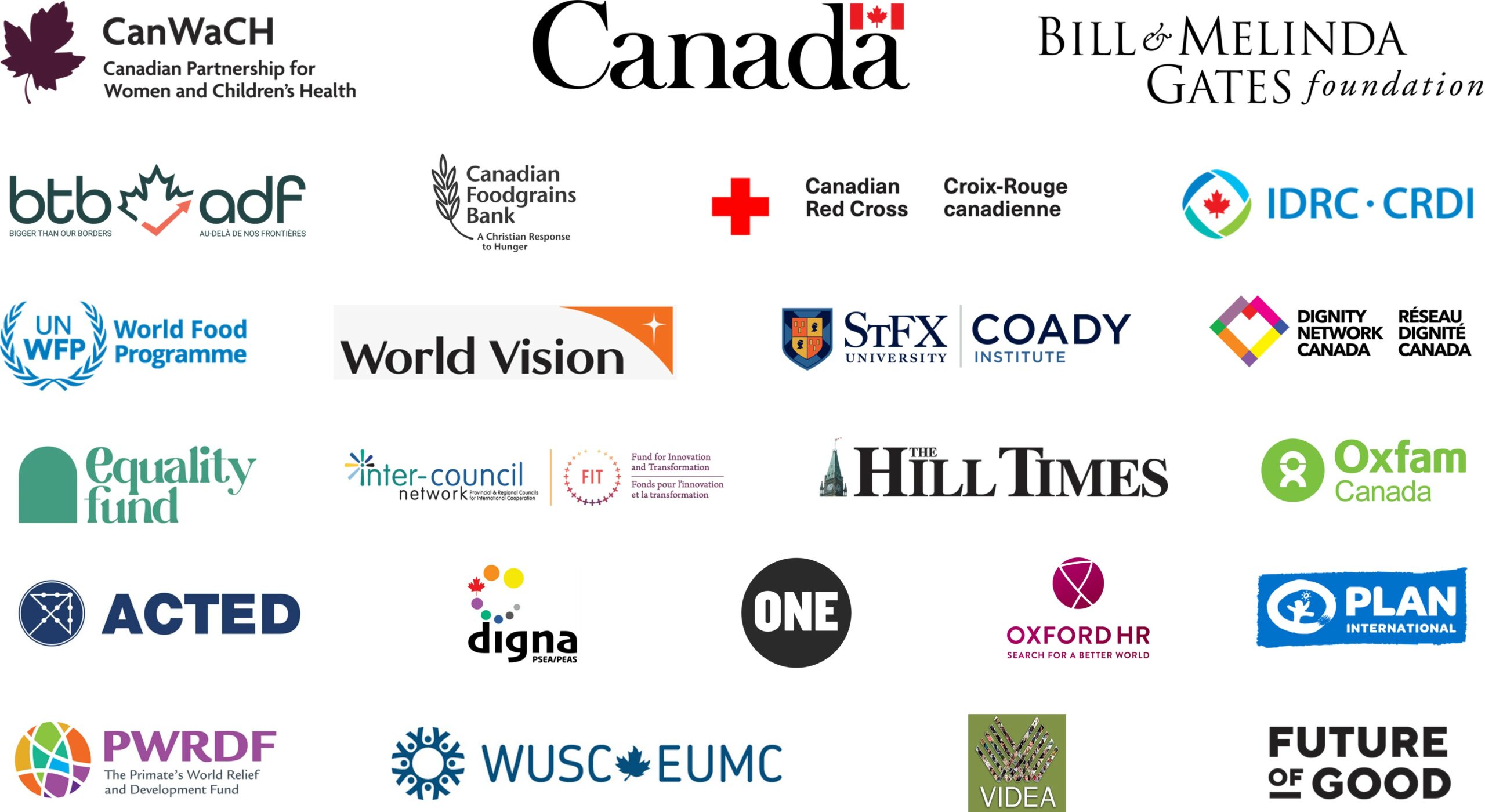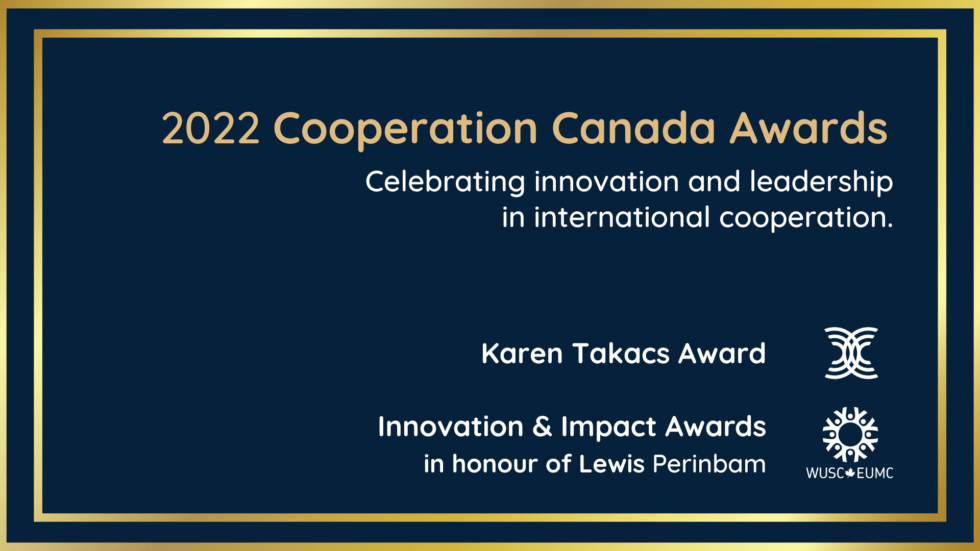
by Cooperation Canada | Nov 23, 2022 | Cooperation Canada Awards, export, News
The Cooperation Canada Awards recognizes excellence and merit in the field of international cooperation by awarding prizes to individuals or organizations that have distinguished themselves in the past year.
The Karen Takacs Award is presented annually to an individual who has notably, by virtue of working collaboratively, made a difference in the lives of women globally. The award honours outstanding collaborative leadership and commitment to promoting women’s equality.
World University Service of Canada (WUSC) and Cooperation Canada, in collaboration with the trustees of the Lewis Perinbam Award, jointly present the call for nominations for the Innovation and Impact Awards in honour of Lewis Perinbam. These awards recognize Canadian individuals and civil society organizations that are doing impactful and innovative work in the field of global development.
The call for nominations is now open until December 19th.
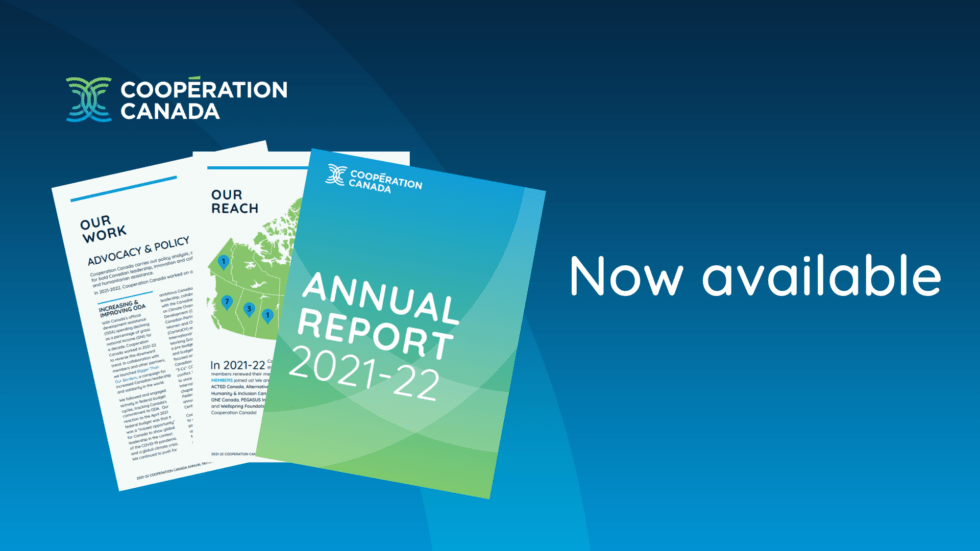
by Cooperation Canada | Nov 10, 2022 | Cooperation Canada Publications, export, News, Publications
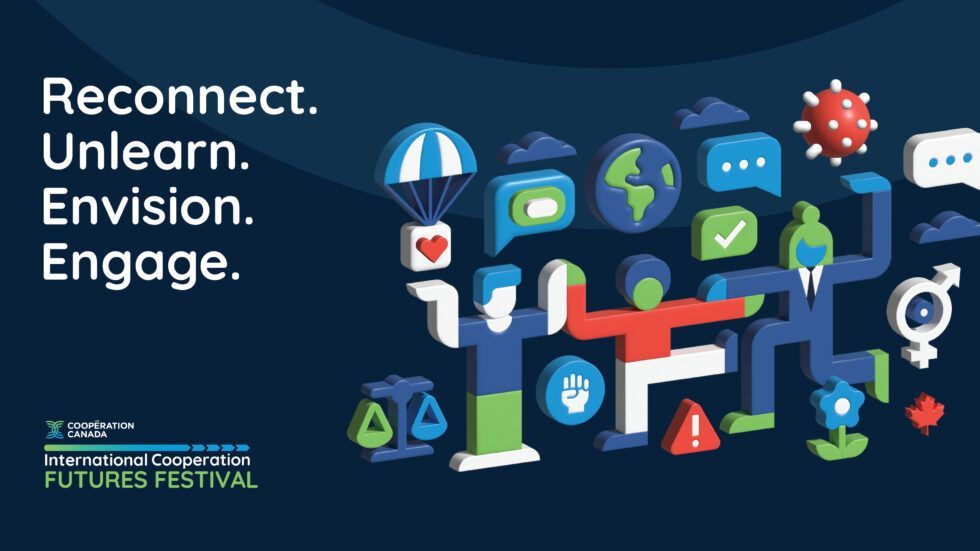
by Cooperation Canada | Nov 9, 2022 | export, International Cooperation Futures Festival, News
Cooperation Canada hosted the located on the unceded and unsurrendered Territory of the Anishinaabe Algonquin Nation, colonially known as Ottawa, Canada, from October 17-20, 2022. The festival’s ambition was to inject new ideas and energy into Canada’s international cooperation ecosystem – and it delivered!
We were thrilled to host over 500 participants from across the world, who represented a range of sectors and perspectives, including civil society, government, politics, academia and the private sector. Together, we examined trends and disruptors in international cooperation. We shared spaces and ideas on how to shape a future that is healthy and where human rights are upheld for everyone, everywhere. We discussed a future where power is shifted to support more effective and localized humanitarian action, and where we are connecting peace, development and humanitarian action to deliver truly integrated triple nexus approaches. We reflected on how to work together for a future is feminist and climate-just. We imagined a future that is anti-racist, ethical, decolonized, and inclusive, including for 2SLGBTQ+ people. We examined innovation in international cooperation and explored how to leverage locally sourced, innovative and blended sources of finance to support sustainable development.
We had the opportunity to engage with decision-makers, including the Minister for International Development, the Hon. Harjit Sajjan and his Parliamentary Secretary Anita Vandenbeld, and several federal Members of Parliament from across the political spectrum. Through the e engaged Canadians – in-person and online – on the connections between the local, national and global dimensions of the global hunger emergency. And we reconnected with friends and colleagues after a long time apart, built trust, understanding and solidarity between those of us who care about Canada’s role in the future of international cooperation, and made new connections and dreamed up new collaborations that will drive real change in ourselves, and in our work around the world.
International Cooperation Futures Festival
Registration desk
Land Acknowledgement
Eileen Alma, Elder Celine Thusky
Opening ceremony
Mike Diabo and guests
Imagining the Future: International Cooperation in 2050
Jean Lebel, Rasha Jarhum, Joseph Messinga Nkonga, Heba Aly, Bryanna Brown
The Future Is Unscripted: Unconference this conference
MP Boisvert, Aislynn Row, Fanta Diaby,
The Future is Healthy and Inclusive: Re-Building Health Systems in a Resource-Scarce Environment
Julia Anderson, Kathrina Loeffler, Diane Francoeur, Tim Evans
The Future is Intersectional: Rethinking Collective Good in International Cooperation
Brianna Parent Long, Leila Moumouni-Tchouassi, Barbara Nzigiye, Noelia Ruiz
The Future is People: Faces from the Frontlines of a Global Health Crisis
Onome Ako, Betty-Anne Daviss, Leah Odle-Benson, Kathrina Loeffler
Trends and Disruptors Shaping International Cooperation Futures
Ketty Nivyabandi, Aisha Francis, Katelynne Herchak,
Dorothy Nyambi, Sara Pantuliano, Kate Higgins, Samantha McGavin
The Future is Anti-Racist: Sustaining efforts towards Anti-Racist change in Canada’s International Cooperation sector
Leila Moumouni-Tchouassi, Nancy Burrows, Barbara Nzigiye, Musu Taylor-Lewis
The Future is Ethical: Building Trust in a Broken System
Sebastian Muermann, Isabelle Auclair, Chloe Schwenke, Christine Bui
The Future is Financed: Locally-Sourced, Innovative, and Blended Finance
Elise Legault, Gerardo Almaguer
The Future is Innovative: Testing Solutions to Advance Gender Equality and Health Outcomes
Christina MacIsaac, , Darcy Ataman, Khalid Hashi
The Future is Inclusive: 2SLGBTQI+ Participation in International Cooperation
Chloe Schwenke, Tashi Pietrzykowska, Michaël Arnaud, Joseph Messinga Nkonga
The Future is Integrated: Breaking Silos Through Triple Nexus Action
Rebekah Sears, Rasha Jarhum, Shannon Paige, Stéphane Vinhas
The Future Is Storytelling: Reclaiming the Power of Tradition
Louise Profeit-LeBlanc,Skaydu.û (Autum Jules), Fanta Diaby
The Future is Political: Global Issues, Realpolitik and Canadian Leadership in International Cooperation
Anjum Sultana, Kristina Farrell, Amar Nijhawan, Shannon Kindornay
In conversation with the Minister of International Development
, Odette McCarthy,Kate Higgins, Rabi Adamu Musa, The Honourable Harjit S. Sajjan
In conversation with the Minister of International Development
Lotfullah Najafizada, Rabi Adamu Musa, The Honourable Harjit S. Sajjan, Odette McCarthy
International Cooperation Futures Festival 18
André Krummacher,
The Future is Decolonized: Shifting Power in Narratives and Practice
Arbie Baguios, Barbara Nzigiye, Joseph Messinga Nkonga, Karri-Lynn Paul,
Leila Moumouni-Tchouassi
International Cooperation Futures Festival 20
Lotfullah Najafizada,
International Cooperation Futures Festival 22
Michaël Arnaud
The Future is Shared: Visiting a Human Library 2
Heba Aly, Mandeep Tiwana, Josephine Kizza Alidekki
The Future is Shared: Visiting a Human Library 3
Karri-Lynn Paul, Bryanna Brown, Skaydu.û (Autum Jules), Darcy Ataman
International Cooperation Futures Festival 25
Kimberly Gibbons
The Future in Focus: A Critical Tour of International Cooperation Imagery and the Stories We Tell
With the help of our content partner, Future of Good, the International Cooperation Futures Festival daily insights during the event.
As part of the festival, Future of Good published a series of articles addressing major themes from the International Cooperation Futures Festival, highlighting lessons and insights on how Canadian and global changemakers can reimagine international cooperation and humanitarian aid. You can find the three stories of the Future of Global Cooperation, by author Neha Chollangi, here.
Part 1: “PEACE IS A VERB, NOT A NOUN”: WHY MODERNIZING GLOBAL COOPERATION AND AID MUST START WITH REFRAMING LANGUAGE
Part 2: “WE SHOULDN’T BE GOSSIPING ABOUT AFGHANISTAN FROM AFAR”: AFGHAN JOURNALIST ON HOW FREE PRESS AFFECTS INTERNATIONAL AID
Part 3: AFRICA IS LOSING $88.6 BILLION THAT COULD BE PUT TOWARD LOCALLY-LED DEVELOPMENT, EXPERTS SAY — HERE’S HOW
You can learn more on the sessions and activities of the International Cooperation Futures Festival here.
The International Cooperation Futures Festival was made possible by the support of our incredible partners who shared our vision and ambition for this festival. We would like to extend a special thanks to our Gold Partners, CanWaCH, the Bill and Melinda Gates Foundation, and Global Affairs Canada, our Silver Partners, Bigger Than our Borders, Canadian Foodgrains Bank, Canadian Red Cross, International Development Research Centre, World Food Programme, and World Vision, our Bronze Partners, the Coady Institute, Dignity Network, Equality Fund, Inter-Council Network’s Fund for Innovation and Transformation, The Hill Times and Oxfam Canada, and all our Supporters and Devotees, for everything they did to make this event happen.
On behalf of the Cooperation Canada team, thank you to everyone who took part in the International Cooperation Futures Festival! Thank you for or prioritizing partnership, collaboration and solidarity. For being open to challenging yourselves – and the status quo. And for wanting to be part of a reimagining of the future of international cooperation – and the changes that Canadian international cooperation actors need to embrace to be relevant and ready to make a difference in years to come!
by Cooperation Canada | Oct 12, 2022 | export, News
On September 15, 2022, Canada took over the presidency of the Community of Democracies (CoD) from Romania for a period of one year. Cooperation Canada is thrilled to see Canada take this leadership role, with Canada’s Minister of Foreign Affairs, Mélanie Joly, being instrumental in promoting the values and standards outlined in the Warsaw Declaration, i.e., “advance and protect democratic freedoms, strengthen democratic institutions, and expand political participations.”[1] The Community of Democracies upholds these values as being essential to counter the threats on democracy and the rise in authoritarianism. Its civil society arm, the Civil Society Pillar (CSP), plays a key role in advancing those values through coordination, advocacy, and innovation. However, that important role has been somewhat undermined of late.
The CSP held their Assembly of Members of the Pillar on September 19 and 20 in New York City, on the margins of the United Nations General Assembly. The agenda on the first day included a presentation from CoD’s Secretary General, Thomas Garrett, as well as discussions with country representatives from Canada, Romania and the United States. Conversations that centered on fundamental issues around the CSP’s role in the Community and the renewal procedure for countries experiencing democratic backsliding were also covered. The second day’s talks were focused on processes within the CSP, including the transition of the chair role of the Pillar from Fundación Multitudes to Redlad, the Latin America and Caribbean Network for Democracy. During that week was also scheduled CoD’s ceremonial transition of power at the Canadian Mission in New York City and attended by Minister Joly and Romania’s Minister of Foreign Affairs. The CSP was invited to attend online but regrettably no representative was invited to attend in person, despite the presence of many CSP members in New York.
This latest attack on the legitimacy of the CSP follows the contested process that led to the renewal of Hungary’s membership to the CoD. The CSP was vehemently opposed to it because of Hungary’s recent democratic regression. The CSP’s strong recommendation not to move forward with their membership renewal was ignored, calling into question not only the country renewal process but also the very existence of the CSP. Many concerns were discussed this past month at the Assembly of Member of the Pillar, and the conversation will undoubtedly continue on wider questions around civil society involvement and weight in the democratic process.
As newly elected CoD President, Canada has the opportunity to bring meaningful change and challenge the status quo. As civil society focal point for CoD in Canada, Cooperation Canada is optimistically cautious, acknowledging the big task ahead to make sure civil society’s voices are heard and taken into consideration in CoD governance. We look forward to working with the new Presidency team to strengthen Canada’s leadership and bolster civil society participation in the Community’s mission.
[1] https://community-democracies.org/values/warsaw-declaration/
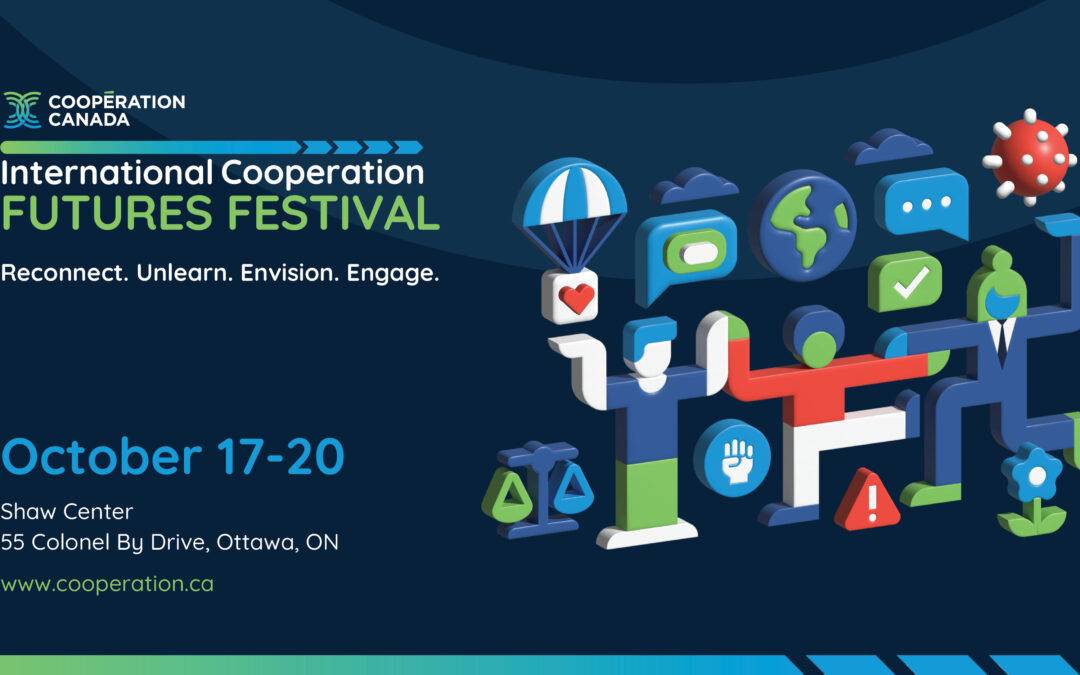
by Cooperation Canada | Oct 12, 2022 | export, News, Press Release
Wednesday, October 12th 2022 (Ottawa) – Cooperation Canada is excited to host the International Cooperation Futures Festival at the Shaw Centre, located on the unceded and unsurrendered territory of the Anishinaabe Algonquin Nation, colonially known as Ottawa, Canada, from 17th to 20th October 2022.
The festival will bring together over 300 change-makers from Canada and the world to examine the trends and disruptors that are shaping the future of international cooperation. Sessions will cover the future of the humanitarian system, the global hunger crisis, intersectional feminism, climate justice, decolonizing development, democracy, human rights and innovative finance.
At a time when collision of COVID-19, conflict and climate crises has set the world back decades on poverty, Russia’s war on Ukraine has led to massive movements of people, the world faces a global hunger crisis, and there’s a resurgence of anti-democratic and anti-rights forces around the world, these conversations are more important than ever.
Speakers and participants will come from civil society, government, parliament, academia, business and philanthropy.
The Festival at a Glance
The International Cooperation Futures Festival will be an in-person conference. Kate Higgins, Cooperation Canada’s CEO, explains:
“We heard from our members, government officials, civil society partners and others in the international cooperation ecosystem that there is a strong desire to come together in person – to reconnect, unlearn, envision and engage on the future of international cooperation. We are excited to welcome hundreds of people to this festival, to engage with new ideas, make new connections, and reflect on the collective action we need to take to realize a fairer, safer and more sustainable world.”
The festival will feature plenaries, interactive sessions, and networking experiences. World-leading social activists, analysts, journalists and decision-makers will attend the festival.
Here are some of the festival’s highlights:
- The Walrus Talks public event and reception on the global hunger crisis at the National Gallery of Canada, featuring: Rachel Blais, Executive Director, Qajuqturvik Community Food Centre; Sophie Gebreyes, Country Director, Ethiopia, World Lutheran Federation; Marcel Groleau, President, UPA Développement international; Neil Hetherington, Chief Executive Officer, Daily Bread Food Bank; Jean-Charles Le Vallée, Country Representative – Canada, Inter-American Institute for Cooperation on Agriculture; and Melana Roberts, Chair, Food Secure Canada. This is a joint event co-organized by The Walrus, Canadian Foodgrains Bank, World Vision Canada, World Food Programme, and Cooperation Canada.
- High-level plenary session on trends and disruptors shaping international cooperation, with: Katelynne Herchak, Manager – Indigenous Governance & Decolonial Practice and Policy, head of VIDEA’s Arctic Gender Policy programme; Ketty Nivyabandi, Secretary General, Amnesty International Canada; Dorothy Nyambi, President/CEO, MEDA; Magalie Noel Dresse, Co-President, Centre for Haitian Excellence; and Sara Pantuliano, Chief Executive, ODI. The session will be moderated by prominent Canadian Radio-Canada journalist Sophie Langlois.
- High-level plenary session on imagining the future of international cooperation featuring: Françoise Moudouthe, CEO, African Women’s Development Fund (virtual, in French); Heba Aly, CEO, New Humanitarian; Rasha Sharma, Founder, Peace Track Initiative; Bryanna Brown, Indigenous land and climate activist; Joseph Messinga Nkonga, Permanent Secretary – Fierté Afrique Francophone (in French). This session will be moderated by Jean Lebel, President of the International Development Research Centre.
- A conversation with the Minister of International Development, the Honorable Harjit Sajjan, with Rabi Adamu Musa, Founder, Mcrissar Foundation for Women and Girls – Nigeria; and Odette McCarthy, Executive Director, Equitas/Co-Chair of Board of Directors, Cooperation Canada. The session will be moderated by Afghan journalist in exile in Canada, Lotfullah Najafizada, CEO, AMU TV.
- Many more speakers and activities are featured. Check out the program here.
About Cooperation Canada
Cooperation Canada brings together Canada’s international development and humanitarian organizations and advocates for them by convening sector leaders, influencing policy and building capacity. Together, we work with partners both inside and outside Canada to build a world that’s fair, safe, and sustainable for all.
Press contact
Gabriel Karasz-Perriau
Communications Manager
Cooperation Canada
[email protected]
(514) 945-0309
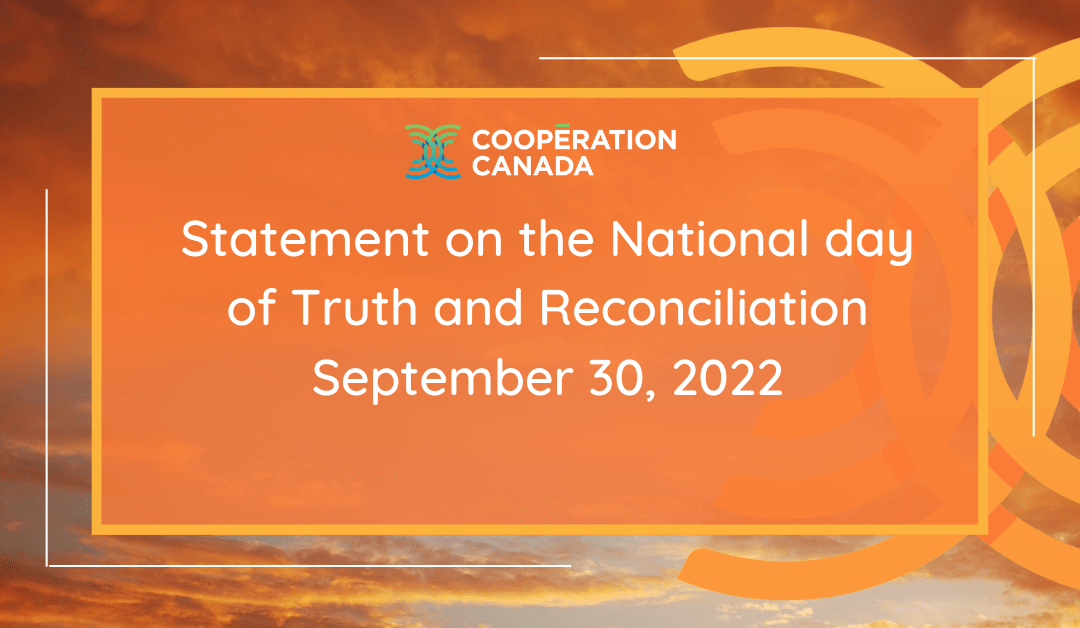
by Cooperation Canada | Sep 29, 2022 | export, National Day for Truth and Reconciliation, News, Statement
As part of shared efforts to advance reconciliation with Indigenous peoples, Cooperation Canada acknowledges the historic and ongoing violence committed against Indigenous peoples on Turtle Island in the name of ‘development’ and the abuse and trauma inflicted by colonization, including through residential schools, on children, their families, and communities. As a national association of international development and humanitarian organizations in Canada, we recognize the importance of engagement and action on truth and reconciliation in Canada, and the ongoing and pressing need to address racism and decolonize our narratives and practices in international cooperation.
On September 30, Cooperation Canada will observe the second National Day for Truth and Reconciliation by closing our offices and encouraging our team to reflect on the painful legacy and impacts of residential schools, and our role in truth and reconciliation. As early and recent settlers on this land, at Cooperation Canada we are unpacking our individual responsibilities and collective duty to speak up and not look away from colonial oppression at home or abroad, and to stand up and not back down in our efforts to promote equity, diversity, inclusion, anti-racism, and justice. Our staff are encouraged to observe Orange Shirt Day on September 30 in consideration for the survivors and intergenerational survivors of the residential school system and commemoration of those who did not return home.
Cooperation Canada recognizes that we can and must do better to address colonial legacies in international cooperation, learning from Indigenous peoples in Canada and across the world.
We encourage all members of the international cooperation community to take part in related events that are planned across the country and consult some of the publicly available resources.




